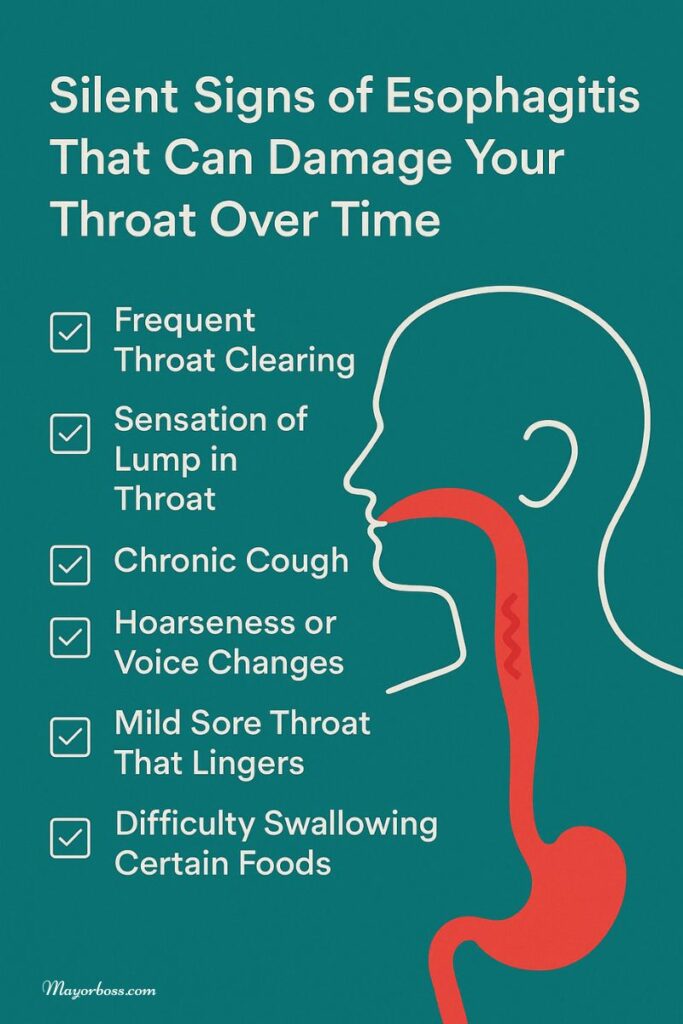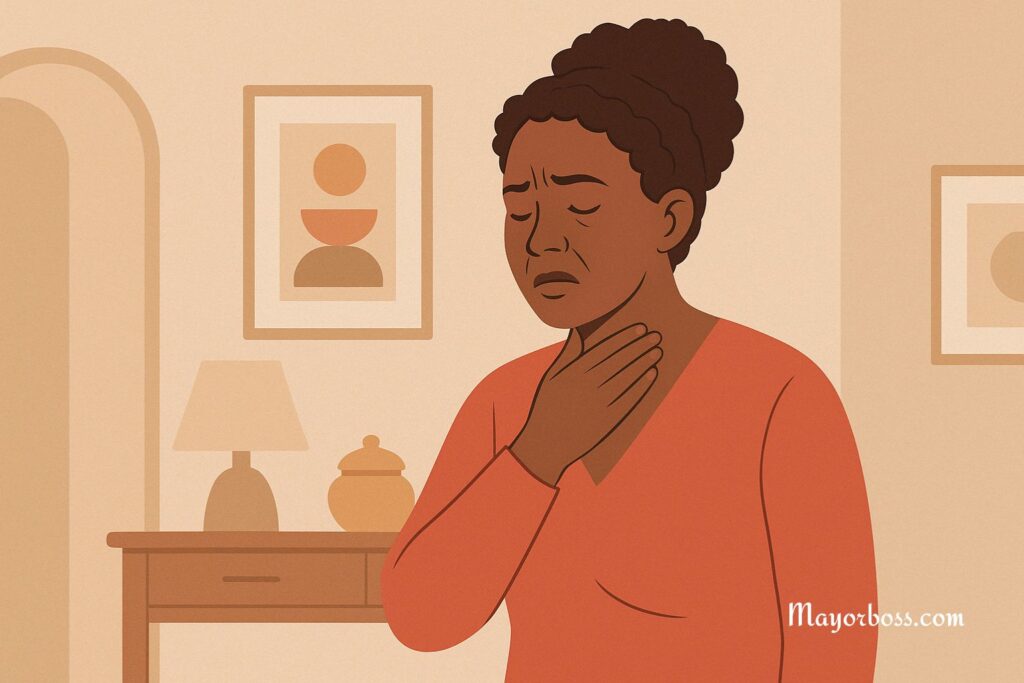Silent Signs of Esophagitis That Can Damage Your Throat Over Time
Esophagitis is inflammation of the esophagus—the tube that carries food from your mouth to your stomach. Most people associate it with painful swallowing or heartburn.1 But sometimes, the signs are subtle. These “silent” symptoms can quietly cause harm if left untreated.
What Is Silent Esophagitis?
Silent esophagitis refers to cases where inflammation develops without the classic signs, like chest pain or burning. This makes it easy to dismiss the symptoms as minor or unrelated. But over time, this ongoing inflammation can lead to complications like scarring, narrowing of the esophagus, or even precancerous changes.
That’s why it’s important to understand the more subtle signs.

1. Frequent Throat Clearing
You might notice a constant need to clear your throat, especially after eating. This can happen when stomach acid or food particles irritate the lining of the esophagus and back of the throat. While it may seem like a mild nuisance, persistent throat clearing is a common warning sign.
2. Sensation of a Lump in the Throat
Many people with esophagitis describe the feeling of something stuck in their throat—even when there’s nothing there. This is called “globus sensation.” It’s not always painful, but it can be uncomfortable and concerning.
This sensation often comes and goes, especially during periods of stress or after meals. If it becomes a regular occurrence, it should be taken seriously.
3. Chronic Cough
If you’ve had a dry, unexplained cough that doesn’t go away, your esophagus may be the cause. Acid reflux and esophageal irritation can trigger the nerves that cause coughing. Unlike a typical cold, this cough won’t improve with over-the-counter medicines for respiratory infections.
A cough that worsens when lying down or at night is especially concerning.
4. Hoarseness or Voice Changes
Ongoing irritation from acid or inflammation can affect your vocal cords. This may lead to hoarseness, especially in the morning. You might find your voice becomes raspy or tired even if you haven’t been talking much.
Some people also report needing to clear their throat more often when speaking.
5. Mild Sore Throat That Lingers
A sore throat from a cold usually goes away within a week. But if the pain persists or returns repeatedly, it could signal irritation from esophagitis. This is especially true if the discomfort worsens after meals or when lying down.
The soreness may not feel severe, but if it doesn’t resolve, it’s time to get evaluated.
6. Difficulty Swallowing Certain Foods
Esophagitis can make the esophagus swell or scar, which leads to difficulty swallowing—called dysphagia.2 This might begin with certain dry or rough foods, like bread or meat. You may feel like food takes longer to go down or sticks for a moment before moving into the stomach.
If you find yourself chewing longer, drinking more water with meals, or avoiding certain foods, your body may be compensating for an irritated esophagus.
Why You Should Take These Signs Seriously

Even when mild, these signs point to ongoing inflammation in a part of the body that plays a vital role in digestion. Left untreated, esophagitis can cause:
- Ulcers in the esophagus
- Scar tissue that narrows the food passage
- Bleeding from irritation
- Barrett’s esophagus, a condition that may raise the risk of esophageal cancer
What Causes Silent Esophagitis?
The most common cause is acid reflux, especially when it occurs at night.3 Other triggers include:
- Certain medications (like pain relievers or antibiotics)
- Infections (such as fungal or viral esophagitis, often in people with weakened immune systems)
- Allergic reactions (eosinophilic esophagitis)
- Radiation therapy to the chest or neck
When to See a Doctor
If you experience any of the symptoms listed above for more than two weeks, talk to your doctor. Even if they seem minor, they could signal a deeper problem.
A simple exam and diagnostic test, like an endoscopy or pH monitoring, can help identify the cause and guide treatment.
Treatment and Relief
Treatment depends on the cause. Options may include:
- Proton pump inhibitors (PPIs) to reduce acid
- Antibiotics or antifungals for infections
- Steroids or diet changes for allergic causes
- Lifestyle changes, such as avoiding trigger foods, eating smaller meals, and staying upright after eating
Early care helps heal the esophagus and prevents future damage.
Final Thoughts
Esophagitis doesn’t always announce itself with sharp pain or burning. Sometimes, the signs are soft and gradual—just a little throat clearing here, a dry cough there. But your body is still signaling distress.
If these subtle symptoms become part of your daily life, don’t ignore them. The sooner you seek care, the better the outcome.
